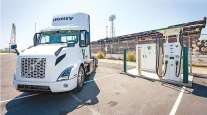Staff Reporter
FHWA Charting Path for National EV Charging Network

[Stay on top of transportation news: Get TTNews in your inbox.]
Due to a lack of national standards and different practices at electric vehicle charging stations, the Federal Highway Administration is preparing to establish regulations that shape what those stations must be like in states that receive federal funds.
FHWA has outlined areas in which today’s nascent development of EV charging infrastructure — which has evolved on an ad hoc basis mostly by private industry — must be improved on a national scale if states are to use $7.5 billion in bipartisan infrastructure law money earmarked to increase public use of EV charging and alternative fueling facilities.
“Currently, there are no national standards for the installation, operation or maintenance of EV charging stations,” FHWA stated in its June 22 notice of proposed rule-making and comment solicitation.

It added that “wide disparities exist among EV charging stations in key components, such as operational practices, payment methods, site organization, display of price to charge, speed and power of chargers, and information communicated about the availability and functioning of each charging station.”
The bipartisan infrastructure law mandates the federal government set minimum standards and requirements in the following:
- Having qualified technicians of EV infrastructure for charging station installations, operations and maintenance while standardizing payments and customer support.
- Enabling EV charging infrastructure interoperability for a seamless national network across states that use the same software and communicate with each other.
- Regulating the acquisition, installation and operation of traffic control devices and on-premise signs at charging stations.
- Specifying network connectivity — communications for charger to charger networks, charging networks to charging networks and charging networks to electrical grids.
Another important area for national uniformity is easily accessible information on publicly available EV charging station locations, pricing, real-time availability and accessibility through mapping applications.
States would have to enable free access for third-party software developers to basic charging station information (locations, connector types and power levels) along with real-time status and pricing.
“FHWA believes these requirements would enable effective communication with consumers about available charging stations and help consumers make informed decisions about trip planning and when and where to charge their EVs,” noted the proposed rulemaking.
To safeguard against price gouging, FHWA also proposes requirements for public transparency when EV charging prices are by a third party.
In addition, FHWA wants states to submit quarterly data about EV charging station use, reliability and installation costs. Each year, states also would have to identify organizations that operate, maintain or install EV supply equipment and submit an annual report describing community engagement efforts done as part of state EV infrastructure deployment plans.
So far, FHWA has received more than 40 public comments in response to its notice, including a combined letter from Ceres Corporate Electric Vehicle Alliance (a coalition of 31 major companies and fleet operators) and NAFA Fleet Management Association representing more than 2,000 individual fleet manager members from private industry, public safety, education, government and utilities.
FHWA today announced a Notice of Proposed Rulemaking on minimum standards for projects funded under the National Electric Vehicle Infrastructure Formula Program, a step towards making EV charging accessible to all Americans. https://t.co/Uu4evGFo9m #BipartisanInfrastructureLaw pic.twitter.com/BAB1WADVzT — Federal Highway Admn (@USDOTFHWA) June 9, 2022
Among the groups’ main concerns was appropriate siting for EV charging facilities that take into account the needs of commercial vehicles and trucks. Much of the federal and state focus has been on locating charging stations along highway corridors. However, the Alliance-NAFA letter referred to its survey indicating that operators of fleets and commercial vehicles would mostly charge EVs at employee homes (42%) and private fleet depots (26%), with 32% of charging needs on-road.
It advised that states place charging stations in locations supporting the largest number of commercial vehicles by analyzing commercial traffic/goods movement patterns on interstate highway systems and near densely populated and/or urban areas. “State planning agencies should coordinate with fleets and EV charging corridor partners and initiatives to determine ideal charger placement and ensure data-based planning,” the letter suggested.
The groups advocated the need to have charging stations near truck stops and travel centers that provide access to bathrooms, restaurants and indoor facilities as well as signage placed at least one mile ahead of upcoming EV charging stations.
“States should also strongly consider additional and complementary EV charging proposals from authorized commercial fleet operators (who operate within or across the state) that enable deployment of EV charging stations for semi-private commercial fleet use,” it added.
Other considerations for commercial vehicles should require charging stations to be designed to accommodate heavy-duty truck needs for a turning radius within a station and at ingress and egress points as well as pull-through parking slots for charging to accommodate tractors pulling trailers.
The groups urged “state transportation and energy agencies to site and design public EV charging infrastructure in a way that spurs EV adoption and enables both individual users and commercial fleet operators to take advantage of the robust benefits offered by vehicle electrification.”
The deadline for public input is Aug. 22.
Want more news? Listen to today's daily briefing below or go here for more info:




